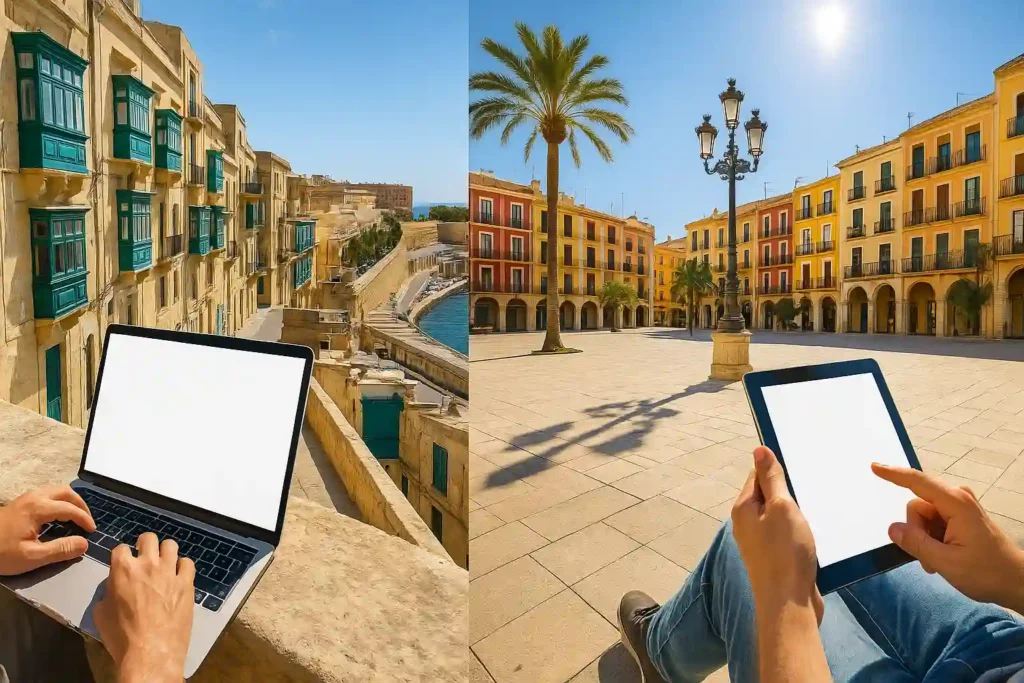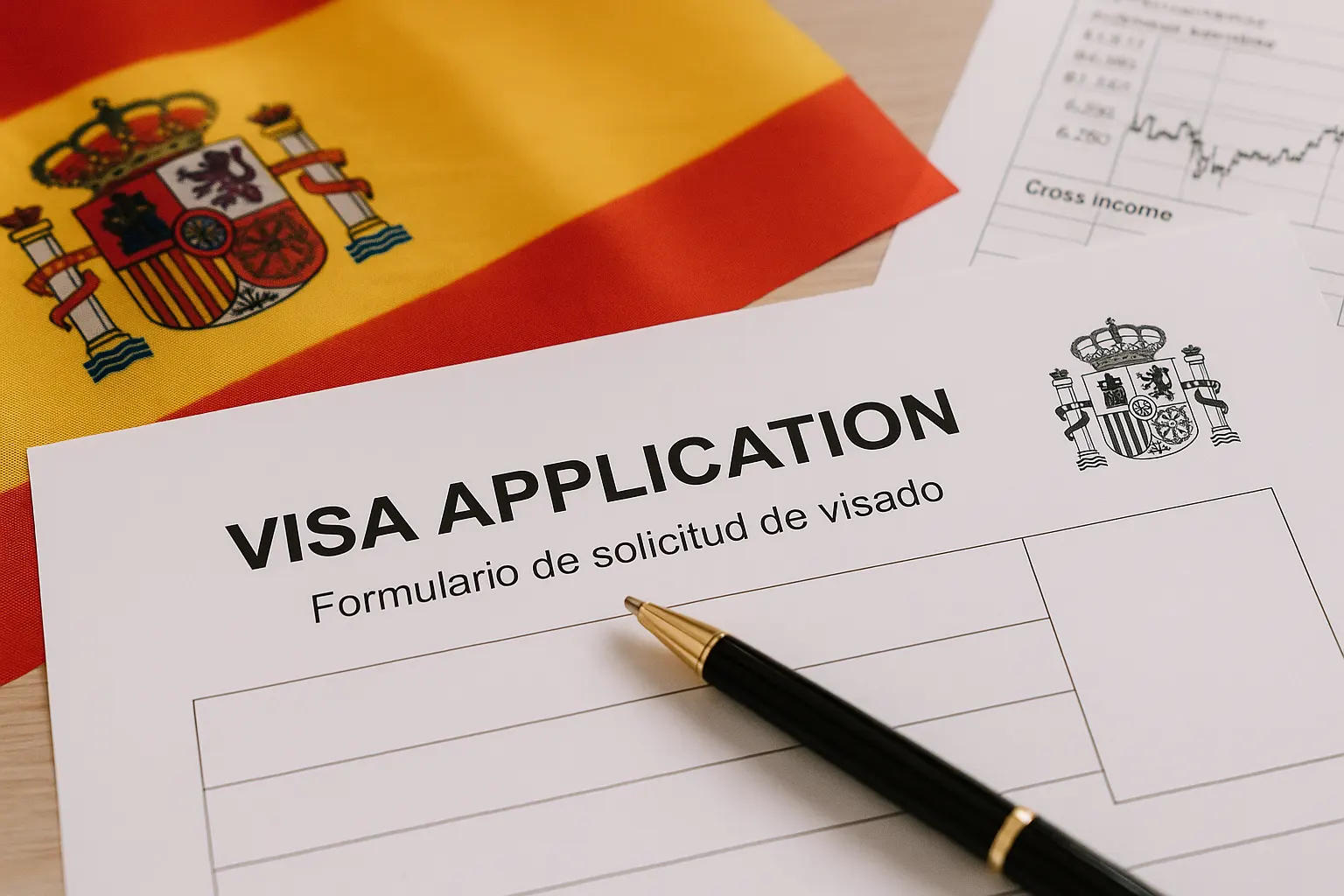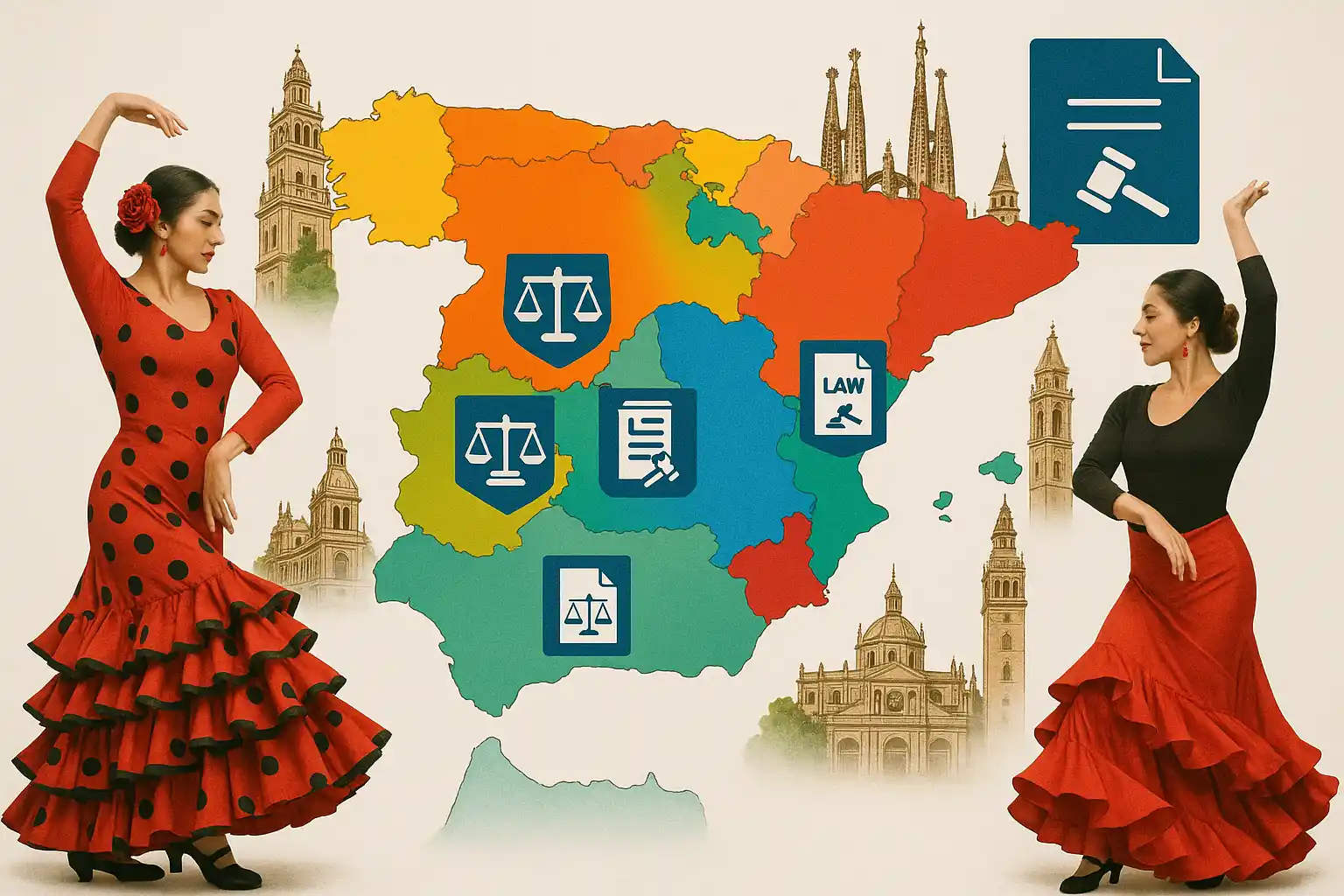The rise of remote work has spurred global demand for digital nomad visas, designed to accommodate professionals seeking location independence while maintaining legal residence abroad. Navigating visa options is critical to securing work flexibility, ensuring legal compliance, and optimizing financial advantages.
Key considerations when evaluating the Malta digital nomad visa vs Spanish digital nomad visa include:
- Legal residence duration: How long the visa allows stay and possibilities for renewal.
- Income and financial criteria: Minimum earnings required to qualify.
- Tax implications: Rates applied and protections against double taxation.
- Pathways to residency or citizenship: Long-term settlement opportunities.
- Application complexity and costs: Processing times and fees.
This review provides a side-by-side comparison of the digital nomad visa Malta requirements alongside those for Spain, offering clarity for professionals weighing options between these popular European destinations. For those considering other options, such as Thailand, Italy, or Estonia, we also have comprehensive guides available on those topics. Additionally, if you’re a startup looking into remote work possibilities, our comparison of the Spain Startup Visa vs Digital Nomad Visa could provide valuable insights.
Key Differences Between Malta and Spain’s Digital Nomad Visas
The Malta digital nomad visa and the Spain digital nomad visa have different features designed for various remote work lifestyles and priorities. A detailed comparison of the two visas reveals several important areas:
|
Aspect |
Malta Digital Nomad Visa |
|
|
Duration |
One-year visa with the possibility of three renewals, allowing a total stay of up to four years |
Initial one-year visa extendable annually up to five years |
|
Income Requirements |
Minimum monthly income of €3,500 |
Proof of at least €2,760 per month |
|
Tax Benefits |
Flat 10% tax rate on foreign income earned by digital nomads |
24% tax rate but with extensive double taxation agreements to avoid overlapping tax liabilities |
|
Residency Pathways |
Designed exclusively for temporary residence without direct citizenship options |
Clear route towards permanent residency or eventual citizenship after five years |
|
Application Process |
Processing time averages around 60 days with an application fee of approximately €300 plus biometrics charges |
Procedure can be completed between 15 and 45 days with a lower cost near €80, although additional expenses may apply |
|
Cost of Living Considerations |
Living expenses tend to range from €1,100 to €2,000 monthly depending on lifestyle and location |
Spanish cities offer a variety of affordable housing options alongside moderate living costs suitable for digital nomads |
These differences influence the decision-making process for remote workers who are trying to figure out which visa best fits their legal, financial, and lifestyle goals. It’s also essential to consider factors such as health coverage, especially for immigrants, which can vary significantly between countries. For instance, key facts on health coverage of immigrants reveal critical insights that could affect your choice.
1. Duration and Renewability
Understanding the malta digital nomad visa duration and spain digital nomad visa duration is essential for planning your stay abroad.
Malta Digital Nomad Visa
- Issued initially for one year.
- The visa can be renewed up to three additional times, allowing a maximum continuous stay of four years.
- Each renewal requires meeting the same eligibility criteria, including income verification and proof of remote work status.
Spain Digital Nomad Visa
- Granted initially for one year as well, but offers a longer potential extension period.
- After the first year, the visa can be extended annually up to a total of five years.
- This provides increased stability for those seeking a longer-term remote working arrangement in Spain.
Both countries emphasize temporary residence tailored to digital nomads, yet Spain’s option for an extended five-year stay may appeal to individuals looking to establish a more prolonged presence. Malta’s renewability up to four years offers flexibility without immediate pathways beyond temporary residency.
2. Income Requirements
The Malta digital nomad visa income requirement sets a higher financial threshold compared to Spain’s program. Applicants must provide evidence of a stable monthly income of at least €3,500. This figure aims to ensure that digital nomads can comfortably sustain themselves while residing in Malta without relying on local resources.
In contrast, the Spain digital nomad visa income requirement is more accessible, requiring proof of a minimum monthly income of €2,760. This lower amount reflects Spain’s broader approach to attracting remote workers and aligns with the country’s generally moderate cost of living.
Key points regarding income requirements:
- Malta: Minimum €3,500 per month
- Spain: Minimum €2,760 per month
Comparing Malta digital nomad visa vs Spanish digital nomad visa, the difference in income threshold may influence applicants depending on their earning capacity and lifestyle preferences. The Maltese standard demands a higher financial proof, potentially limiting eligibility but ensuring economic self-sufficiency. Spain’s requirement offers greater flexibility for remote workers with varying income levels.
Understanding these financial criteria is crucial for candidates evaluating which visa best fits their economic situation and long-term plans.
3. Tax Benefits
Understanding the tax benefits Malta digital nomads and tax benefits Spain expatriates can expect is crucial when choosing a destination for remote work.
Tax Benefits in Malta
Malta applies a flat tax rate of 10% on foreign income earned by digital nomads. This low fixed rate is designed to attract remote workers by offering predictable and favorable taxation, encouraging retention during the visa period.
Tax Benefits in Spain
Spain imposes a higher tax rate of 24% on foreign income under its digital nomad program. However, Spain’s extensive network of double taxation agreements (DTAs) with numerous countries helps prevent dual taxation on the same income, which can alleviate potential financial burdens for expatriates.
The difference in approach reflects each country’s broader fiscal policies: Malta favors simplicity and reduced rates to lure international talent, while Spain balances tax revenue with protections against double taxation. Applicants should assess their home country’s treaties with these nations to optimize tax obligations effectively.
4. Residency Options
Residency pathways differ significantly between Malta and Spain for digital nomads.
Spain’s Permanent Residency Pathway
Spain offers a well-defined route to permanent residency and eventual citizenship. Digital nomads can apply for permanent residency after maintaining legal residence for five consecutive years under the digital nomad visa or other valid permits. This status allows for longer-term stability and benefits such as easier access to social services and family reunification options.
Malta’s Temporary Residency Approach
Malta’s digital nomad visa is designed strictly as a temporary residence permit. It allows stays up to four years through renewals but does not provide a direct pathway to permanent residency or citizenship. Applicants looking for long-term settlement must explore other visa categories beyond the digital nomad scheme.
Key considerations for applicants include:
- Eligibility criteria for permanent residency options Spain digital nomads emphasize continuous residence, compliance with local laws, and proof of financial self-sufficiency.
- Citizenship in Spain generally requires ten years of legal residence, with some exceptions reducing this period based on nationality or marriage.
The choice between Malta’s temporary focus and Spain’s extended residency prospects will influence decisions depending on long-term goals.
5. Application Processes
The Malta application process for a digital nomad visa is relatively straightforward but involves a longer processing time compared to Spain. Applicants should anticipate about 60 days from submission to approval. The process requires:
- Submission of the completed application form online
- Payment of a non-refundable fee of €300
- Attendance at a biometrics appointment for identity verification
- Provision of supporting documents including proof of income, health insurance, and background checks
This procedure emphasizes thorough vetting, reflecting Malta’s cautious approach to granting temporary residence.
In contrast, the Spain application process for the digital nomad visa is designed for faster turnaround, generally within 15 to 45 days. The lower application fee, approximately €80, makes it more accessible financially. Additional expenses may include document translation, apostilles, and health insurance premiums from approved Spanish providers.
Key steps in the Spanish process include:
- Online or consular submission of application forms
- Presentation of proof of income, accommodation, and valid health insurance
- Biometrics and interview (when required)
- Receipt of the initial one-year visa with possibilities for renewal
Comparing Malta digital nomad visa vs Spanish digital nomad visa highlights differences in administrative efficiency and cost-effectiveness. Spain’s expedited processing fits applicants seeking quicker entry, while Malta’s longer timeline corresponds with its detailed examination procedures.
Understanding these distinctions in application processes is crucial when selecting the most suitable destination for remote work residency.
Lifestyle Considerations for Digital Nomads in Malta and Spain
The cost of living Malta vs Spain presents notable differences that impact remote workers’ lifestyle choices. Monthly expenses in Malta typically range from €1,100 to €2,000. This estimate includes accommodation, utilities, groceries, and transportation. Malta’s compact size enables easy access to amenities but housing prices, especially in prime locations like Valletta or Sliema, tend to be higher compared to many Spanish cities.
Spanish urban centers offer a more diverse spectrum of living costs. Cities such as Barcelona, Madrid, Valencia, and Alicante provide moderate expenses coupled with affordable housing options. Rent prices vary significantly by city and neighborhood — while Barcelona’s central areas can be pricey, Valencia and Alicante are known for more budget-friendly accommodation without sacrificing quality of life.
When considering the overall cost of living for digital nomads, it’s also worth exploring a Spain vs Portugal digital nomad cost comparison. This could provide additional insights into housing costs, taxes, and other essential factors that influence the choice of remote work destination.
Lifestyle Preferences
Lifestyle preferences influence the choice between these destinations:
Malta
- Valletta: Historic charm combined with modern conveniences.
- Sliema: Coastal living with seaside promenades.
- St Julian’s: Vibrant nightlife and social scenes.
Spain
- Barcelona: Cosmopolitan vibe with cultural richness.
- Madrid: Capital city buzz with extensive amenities.
- Valencia: Blend of beach and city life.
- Alicante: Affordable coastal town with relaxed tempo.
This lifestyle comparison for remote workers highlights how each country caters differently to work-life balance priorities, social opportunities, and budget constraints.
Health Insurance Requirements for Malta vs Spain Digital Nomad Visas
Both Malta and Spain require valid health insurance coverage as a prerequisite for obtaining their digital nomad visas. This requirement ensures that applicants have adequate medical protection during their stay, reducing potential burdens on the host country’s healthcare system.
Key distinctions between health insurance requirements Malta vs Spain include:
- Malta: Applicants must provide proof of comprehensive health insurance valid in Malta or internationally. The policy should cover emergency medical treatment, hospitalization, and repatriation. There is flexibility in choosing providers, allowing coverage from international insurers recognized by Maltese authorities.
- Spain: The health insurance policy must come from a Spanish provider or one operating in Spain with full coverage equivalent to the public health system. This condition aims to guarantee seamless access to healthcare services without additional authorizations or out-of-pocket expenses.
Applicants should verify that their insurance meets minimum coverage standards set by each country’s immigration authorities. Failure to comply with these requirements can lead to visa denial or complications during residency.
Understanding the nuances of Malta vs Spain health insurance requirements is essential for digital nomads seeking legal residence and uninterrupted access to healthcare while working remotely abroad. For those considering other options, such as the Japan digital nomad visa, it’s worth noting that there are distinct differences in eligibility, income requirements, application processes, stay durations, and health insurance stipulations when compared to Spain’s digital nomad visa.
Making Your Decision: Choosing Between Malta and Spain as Your Digital Nomad Destination
Selecting the ideal visa involves aligning your personal and professional priorities with what each country offers. When choosing between Malta vs Spain visas, consider these crucial factors:
- Long-term residency ambitions: Spain’s digital nomad visa provides a pathway to permanent residency and eventual citizenship after five years. Malta’s program focuses on temporary residence without direct citizenship options.
- Tax optimization: Malta’s flat 10% tax rate on foreign income may benefit those prioritizing lower taxation. Spain’s higher 24% rate is mitigated by extensive double taxation agreements.
- Application speed and costs: Spanish applications are generally faster and less expensive, which might suit those seeking quicker processing.
- Lifestyle preferences: Vibrant urban life in Spanish cities contrasts with Malta’s island charm, influencing quality of life considerations.
Engaging with specialized immigration professionals like NIM Immigration Lawyers ensures tailored advice reflecting your unique circumstances. Their expertise in both Spanish immigration law and digital nomad visa processes can streamline your application, clarify requirements, and optimize your legal stay in either destination.














